From parched to prosperity: How clean water transformed Gangarasso-Ganye
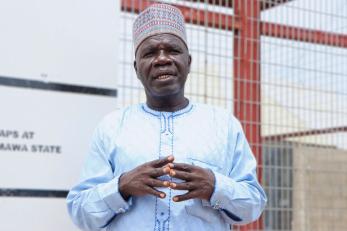
Gangarasso-Ganye, a small town in Adamawa State, Nigeria, is known for its rich culture, farming, and tradition. However, like many rural areas, it faced significant water scarcity and hygiene challenges. The introduction of the Small Town Water, Sanitation, and Hygiene (STWASH) activity marked a turning point, bringing clean water and improved health practices to the town.
Before STWASH's intervention, the residents relied on rainwater or well water, unaware of the dangers of consuming contaminated water. "We didn’t believe in drinking clean water; we only took rainwater or well water. Most times, we would always be in the hospital treating one sickness or the other," Mallam Muhammed recalls. STWASH educated them on the effects of consuming unsafe water, which led to a high rate of dysentery, cholera, and malaria in the community.
In the dry season, many households rely on water vendors who charge 2000 Naira for 10 jerry cans of water. These vendors sell water from hand-pushed trucks and obtain it from sources located far from the community. They then sell the water to the residents.
After the USAID-funded Small-Town WASH activity began implementation in Adamawa state, the situation improved. The initiative involved the Community Leader and other influencers in establishing the Water Consumers Association (WCA) in Gangarasso-Ganye. This association provided leadership and oversaw the management of the water facilities. Additionally, it enhanced the capacity for hygiene promotion and practices, and provided training in the effective operation and maintenance of the facilities.
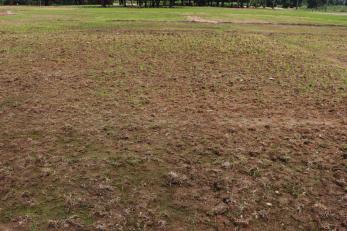
Mallam Muhammed Abo, the Vice Chairman of the Water Consumers Association (WCA) in Gangarasso-Ganye, played a crucial role in this transformation. "I attended the STWASH training that built my capacity in resource mobilization, record keeping, facility maintenance, and water safety planning. I also had a cross-learning visit to Yobe State under the STWASH program," says Mallam Muhammed. This training equipped him with the skills needed to maintain the STWASH facility and ensure its sustainability.
With the knowledge gained from the STWASH Activity’s training, Mallam Muhammed and the Volunteer Hygiene Promoters (VHPs) visit households to educate the community on hygiene and sanitation. These VHPs are dedicated individuals in Gangarasso-Ganye who play a crucial role in educating residents on hygiene and sanitation practices. "As a result of the training from the Activity, we now go on weekly house-to-house hygiene promotion campaigns in the community," he explains. This grassroots effort has significantly reduced waterborne diseases and improved overall health.
The STWASH program has also been substantial economically. "Before now, we used to spend a lot of time, money, and energy just to either buy water from vendors or fetch from the well. However, with STWASH, we no longer pay for water. We only pay a very small token that allows us to maintain the facility," says Mallam Muhammed. The WCA has established a bank account to manage these funds, ensuring that resources are available for repairs and maintenance.
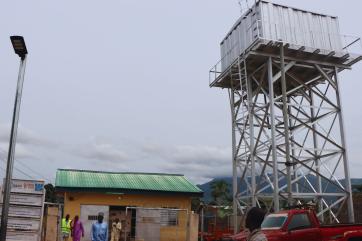
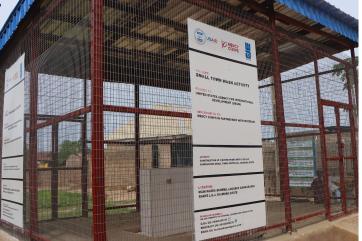
Mallam Muhammed and the WCA shared their learnings with the community through the celebration of International Days like Global Handwashing Day and Menstrual Hygiene Day, organizing events to educate school students and community members on hygiene practices.
The WCA, under Mallam Muhammed's leadership, has also engaged in advocacy to expand water access. "Through training from STWASH, we went on an advocacy visit to the Local Government chairman and other local NGOs. We were able to get water flowing to the interior parts of the community (the project is still in motion). This was done because of the advocacy and resource mobilization learnings we had from STWASH," he explains. Collaborations with community leaders, like Mai Unguwa (ward head), have further amplified their efforts.
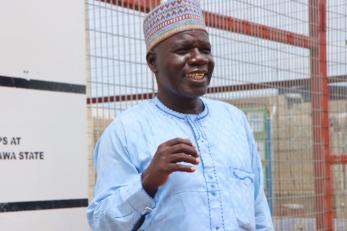
Access to clean water has significantly boosted agricultural development in Gangarasso-Ganye. “Thanks to STWASH, we successfully planted maize and harvested it in March 2024. Now, we have moved on to planting rice,” says Mallam Muhammed. “In the past, we avoided planting during the dry season due to water shortages, but with consistent access to water, we no longer have such fears. This has opened up new opportunities for local production within our community.” He exclaimed with a smile. The locally grown rice is sold at more affordable prices, providing substantial economic benefits to the residents.
Mallam Muhammed Abo’s dedication and the community’s willingness to partner with the STWASH Activity have brought lasting change to Gangarasso-Ganye. Through education, advocacy, and sustainable practices, the community now enjoys improved health, economic stability, and a brighter future.
“Clean water has indeed changed our lives,” Mallam Muhammed concludes with a smile.
About STWASH
The Nigeria Small Town WASH Activity (STWASH) is a 5-year program funded by USAID and implemented by Mercy Corps in partnership with WaterAid in Borno, Yobe, Adamawa, Abia, Delta and Imo states.
The program aims to strengthen the capacity and accountability of key institutions to provide and sustain access to water and sanitation services for 140,000 individuals in small towns across northeastern Nigeria.
The program will facilitate the economic recovery of crisis-affected communities and strengthen the capacity of state governments in providing essential WASH services, while creating and sustaining an enabling environment for Small Towns Water Supply and Sanitation Agencies (STWSSAs) and Water Consumers Associations (WCAs) to operate.
The small towns where the program is being implemented include Mandara Abdu of Biu LGA, Wagini/Anguwan Baba Adamu of Shani LGA, and Kwaya of Kwayakusar LGA; Dumne of Song LGA, Vinikilang of Girei LGA, and Gangarasso-Sangassumi of Gangarasso-Ganye LGA; Lailai of Potiskum LGA, and Kelluri of Geidam LGA.